According to Forbes, US citizens owe $1.75 trillion in total student loan debt. This works out to be around $28,950 owed by former higher education students on average in the US.
Payday loans are unlikely to serve as the best option for students needing some extra money. There are a number of alternatives that may be considered instead, including student loans, grants, bursaries as well as credit cards.
Payday loans may however best suit students in need of emergency funds, such as if they need to pay for an unexpected car repair or medical bill.
What are Payday Loans?
Payday loans are short-term, high-interest monetary loans and take place between a lender and a borrower. This usually occurs when the borrower is unable to seek this amount from banks or credit unions.
The majority of payday lenders charge very high interest rates, and in some states, this amount that they charge is not regulated.
Typically, there is a strict time period in which you are expected to pay back the loan. This lies between around 14 to 28 days.
If you are unable to pay back the loan on time, then you will be charged high interest rates until it is paid back, which can lead to spiraling debt in some instances.
Can I Get a Payday Loan if I am a Student?
Yes, you are able to apply for a payday loan if you are a student as long as you meet the lender’s requirements. These usually entail a minimum income of $800, aged over 18 years old, holding US citizenship as well as a checking account.
During the payday loan application process, the lender will perform both affordability and credit checks on the student that is applying.
Are Payday Loans Suitable for Students?
Payday loans may be suitable for students for use in emergency situations, but should not be considered for regular use. For instance, payday loans should never be used to pay off other loans, or to fund extravagant spending on shopping. As such, they should only ever be used by students as a last resort. This is because they come with short repayment periods and high interest rates.
If a student is unable to repay the payday loan in the given period on time and in full, then they will be charged very high interest on the future repayments. Failing to pay within the time period can also contribute towards lowering their credit score, which can impact future applications for loans and financing.

What are the Alternatives to Payday Loans for Students?
There are a number of alternatives that should be considered by students in need of extra funds before resorting to applying for a payday loan. While it may appear appealing due to the instant and fast nature, it can lead towards spiralling debt on top of existing student loan debt.
Here is a list of a number of alternatives to payday loans for students:
- Student Bursaries or Grants
The majority of US colleges offer their students hardship funds when they are in exceptional financial situations. These are essentially lump sums or installments paid over to a student when they are unable to afford essentials, including basic food, rent or utility bills for example.
Typically, students are not required to pay back these hardship funds. They may apply for these directly through their college by providing financial information about their background, income and address for example.
Furthermore, some colleges may also provide students with the funds in the form of a loan that they will be expected to repay. These typically do not have the same high interest rates as offered by payday loan lenders.
- Credit Cards
Credit cards may also serve as a great alternative to payday loans to students that are in need of additional funds. These students must be over the age of 18 years old, be a US citizen, have a form of income and a passable credit score.
Typically, credit cards granted to students by a bank or credit union will have relatively low credit limits, so that they can be easily repaid. Benefits of having a credit card as a student include building up your credit score, having access to funds in the instances of an unexpected financial situation that needs covering, as well as additional benefits such as discounts.
If you choose to go down the credit card route, you must be aware of the risks too. These include typically low credit limits for students, high interest rates and sometimes additional fees like late payment fees. Furthermore, if a student does not look after their finances responsibly or run into multiple financial emergencies where they need to withdraw funds that they do not have, then they will also risk messing up their credit score which can in turn impact future applications for funds and financing.
- Borrowing from Family or Friends
One of the best alternatives to payday loans for students is borrowing money from family members or friends. This option typically does not incur high interest rates or additional fees such as late payment fees.
Prior to borrowing money, you should come together to put a clear repayment plan together so that there is trust between yourself and the family member or friend that you will eventually repay the funds back to them.


